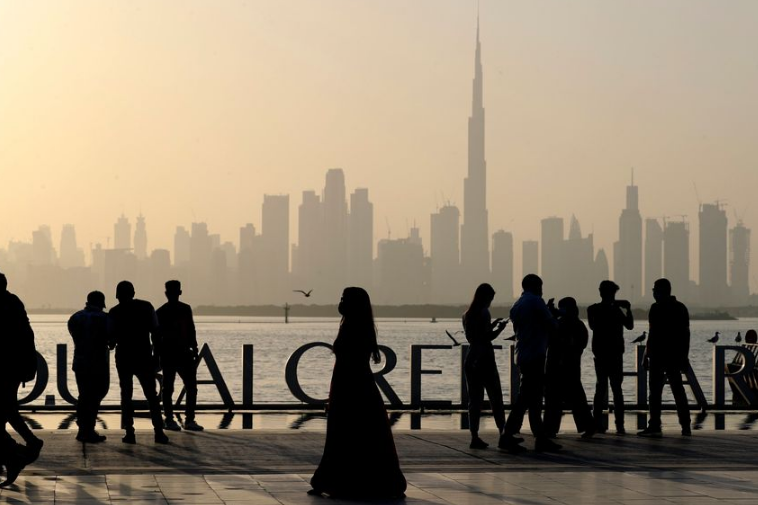The United Arab Emirates said Tuesday it would shift its workweek to match much of the rest of the world, the latest cultural change aimed at marking out the Gulf state as the Middle East’s premier hub for foreign talent and global investment.
The Gulf state said its workweek would start Monday and end Friday at noon when prayers are typically held in mosques throughout the Middle East. The shift from a Sunday-through-Thursday week will start from Jan. 1 and apply to federal government employees. The private sector is expected to follow the government’s lead.
Fridays are generally a day of prayer and family time in the Middle East. To address any conservative backlash, U.A.E. officials mandated that the workday ends at noon on Fridays and said government staff would have the flexibility to work from home. Sermons, normally held after noon on Friday, would begin at 1:15 p.m. local time, the government said.
The shift—the first in the Gulf—is an example of how countries in the region are rethinking Islamic traditions to draw talent from around the world and diversify their hydrocarbon-dependent economies.
The U.A.E. has introduced a series of measures during the Covid-19 pandemic to make it and its major cities, Dubai and Abu Dhabi, more attractive to foreigners, who make up roughly 90% of the country’s nearly 10 million residents.
Those policy changes, such as decriminalizing cohabitation for unmarried couples and allowing alcohol consumption without a license, have come as the region’s biggest economy, Saudi Arabia, is also beginning to liberalize and shake off social structures.
Dubai, in particular, is competing with Riyadh for expatriate talent after Saudi authorities earlier this year warned international companies that they would need to have their regional headquarters in the capital should they want to win business in the kingdom.
As the pandemic has forced people from offices, Dubai has sought to position itself as a global hub for expatriates, offering a $611 yearlong visa to anyone working remotely and longer-term visas for investors in real estate and other assets. The city has attracted thousands of millionaires this year, drawn by an open-border policy.
The change to the U.A.E. is unlikely to affect its economic growth, despite reducing friction with firms in the rest of the world, according to economists. But it is likely to make the country more attractive to live in, and will smooth money flows and the ease with which investors can trade local stock exchanges, they said.
“Equally, though, such a move would increase those frictions and delays with companies in other parts of the Gulf and Middle East that maintain a Friday-Saturday weekend,” said James Swanston, an economist at London-based Capital Economics.
David Hammond, the founder of Dubai-based Drawdeck, said the change will make it easier for his art-printing startup. He sometimes has to wait an extra day for materials to arrive from the U.S. or U.K., delaying deliveries.
“It’s good for business because it just syncs everything,” Mr. Hammond said of the workweek shift.
In 2006, the U.A.E. shifted to the current workweek from a Saturday-to-Wednesday routine. Saudi Arabia followed in 2013 when King Abdullah overrode years of objections from religious conservatives that Saudi Arabia, home of the two most important sites in Islam, should keep a weekend distinct from that of the West.
In the wider Middle East region, most countries, including Israel, follow the Sunday-to-Thursday workweek, while Lebanon and Turkey have a workweek that matches much of the rest of the world.
The pandemic is driving many of the policy shifts in the U.A.E., which has used an aggressive vaccination rollout combined with relatively relaxed border restrictions to keep the economy open. Nearly 90% of the population is fully vaccinated, according to Our World in Data, a project based at Oxford University.








































admin in: How the Muslim Brotherhood betrayed Saudi Arabia?
Great article with insight ...
https://www.viagrapascherfr.com/achat-sildenafil-pfizer-tarif/ in: Cross-region cooperation between anti-terrorism agencies needed
Hello there, just became aware of your blog through Google, and found ...